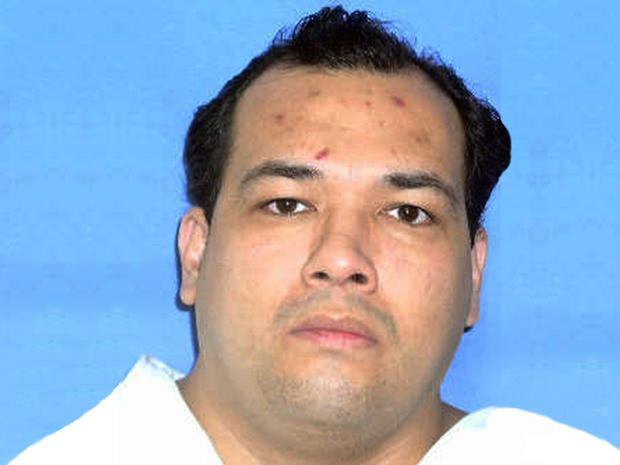Mexican citizen Humberto Leal shouts "Viva Mexico!" before Texas execution
(CBS/AP) HUNTSVILLE, Texas - Mexican citizen Humberto Leal shouted "Viva Mexico!" Thursday shortly before he was put to death by the state of Texas for the 1994 rape and murder of a teenage girl.
Leal and the White House had pleaded in vain for a Supreme Court stay, saying he was denied help from his home country that could have helped him avoid the death penalty.
In his last minutes, Humberto Leal repeatedly said he was sorry and accepted responsibility.
"I have hurt a lot of people. ... I take full blame for everything. I am sorry for what I did," he said in the death chamber.
"One more thing," he said as the drugs began taking effect.
Then he shouted twice, "Viva Mexico!"
"Ready warden," he said. "Let's get this show on the road."
He grunted, snored several times and appeared to go to sleep, then stopped all breathing movement. The 38-year-old mechanic was pronounced dead at 6:21 p.m., 10 minutes after the lethal drugs began flowing into his arms.
After his execution, relatives of Leal who had gathered in Guadalupe, Mexico, burned a T-shirt with an image of the American flag in protest. Leal's uncle Alberto Rodriguez criticized the U.S. justice system and the Mexican government and said, "There is a God who makes us all pay."
Leal was sentenced to death for the 1994 murder of 16-year-old Adria Sauceda, whose brutalized nude body was found hours after he left a San Antonio street party with her. She was bludgeoned with a piece of 30- to 40-pound chunk of asphalt.
Leal was just a toddler when he and his family moved to the U.S. from Monterrey, Mexico, but his citizenship became a key element of his attorneys' efforts to win a stay. They said police never told him following his arrest that he could seek legal assistance from the Mexican government under an international treaty.
Mexico, the Obama administration and others had asked the U.S. Supreme Court to delay Leal's execution so Congress could consider a law that would require court reviews in cases where condemned foreign nationals did not receive help from their consulates. They said the case could affect not only foreigners in the U.S. but Americans detained in other countries.
The court rejected the request 5-4. Its five more conservative justices doubted that executing Leal would cause grave international consequences, and doubted "that it is ever appropriate to stay a lower court judgment in light of unenacted legislation."
"Our task is to rule on what the law is, not what it might eventually be," the majority said.
The court's four liberal-leaning justices said they would have granted the stay.
Mexico's foreign ministry said in a statement that the government condemned Leal's execution and sent a note of protest to the U.S. State Department. The ministry also said Mexican ambassador Arturo
Prosecutors said Sauceda was drunk and high on cocaine the night she was killed, and that Leal offered to take her home. Witnesses said Leal drove off with her around 5 a.m. Some partygoers found her brutalized nude body later that morning and called police.
There was evidence Sauceda had been bitten, strangled and raped. A large stick that had a screw protruding from it was left in her body.
A witness testified that Leal's brother appeared at the party, agitated that Leal had arrived home bloody and saying he had killed a girl.
In his first statement to police, Leal said Sauceda bolted from his car and ran off. After he was told his brother had given detectives a statement, he changed his story, saying Sauceda attacked him and fell to the ground after he fought back. He said when he couldn't wake her and saw bubbles in her nose, he got scared and went home.
Testifying during his trial's punishment phase, Leal acknowledged being intoxicated and doing wrong but said he wasn't responsible for what prosecutors alleged. A psychiatrist testified Leal suffered from alcohol dependence and pathological intoxication.
Sauceda's mother, Rachel Terry, told San Antonio television station KSAT her family already had suffered too long.
"A technicality doesn't give anyone a right to come to this country and rape, torture and murder anyone," she said.
More on Crimesider
July 7, 2011 - White House seeks delay of Mexican Humberto Leal's execution
